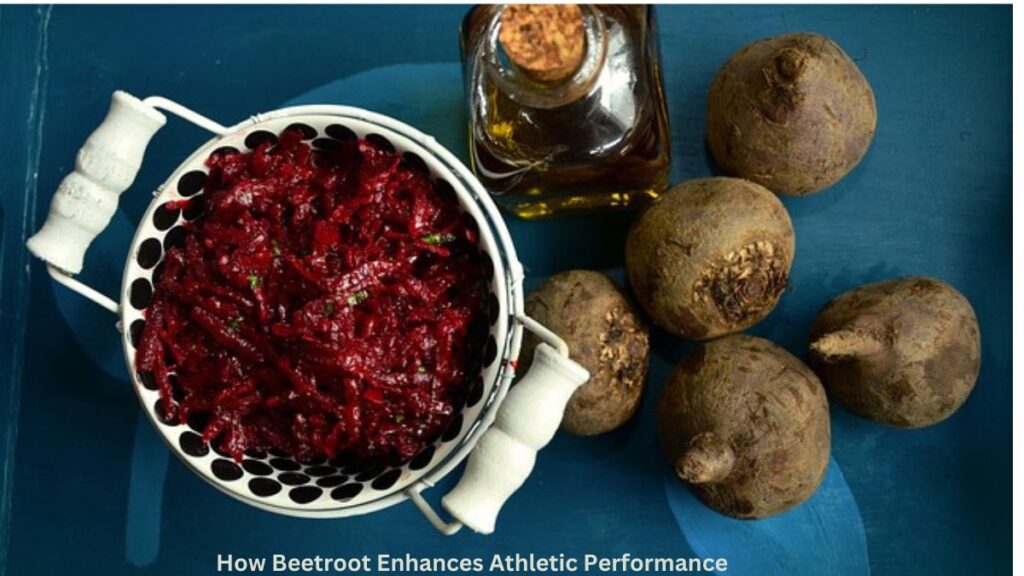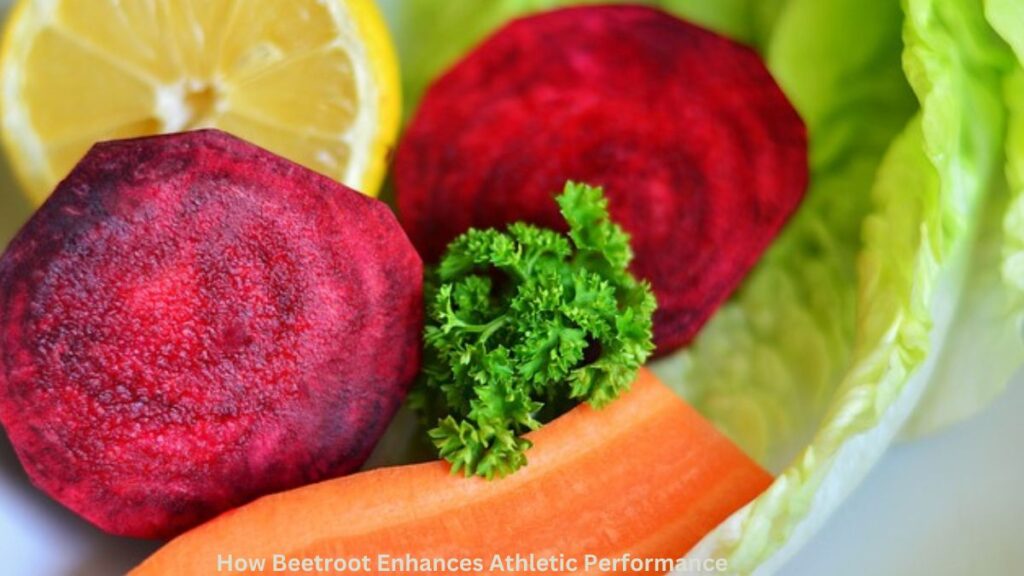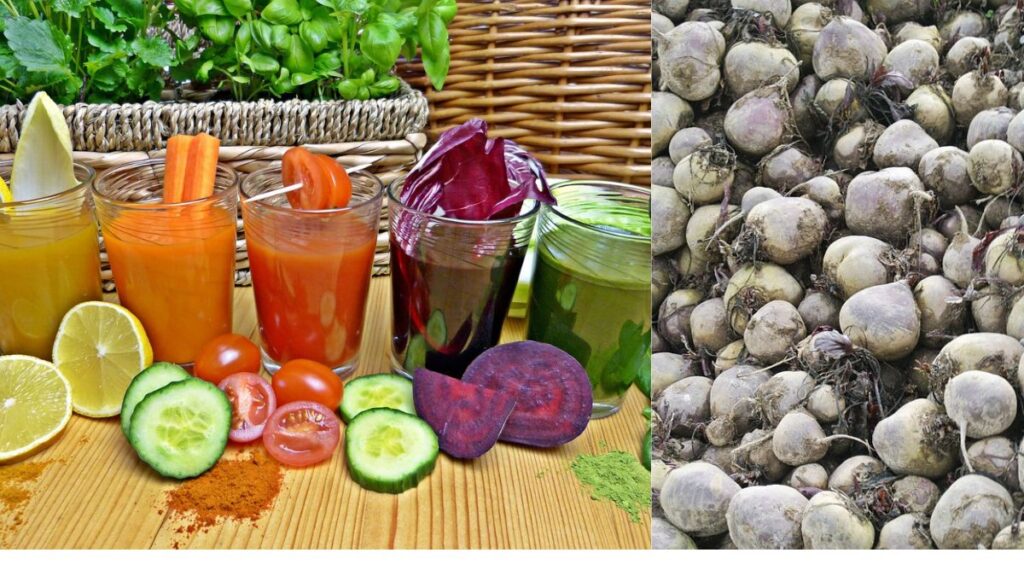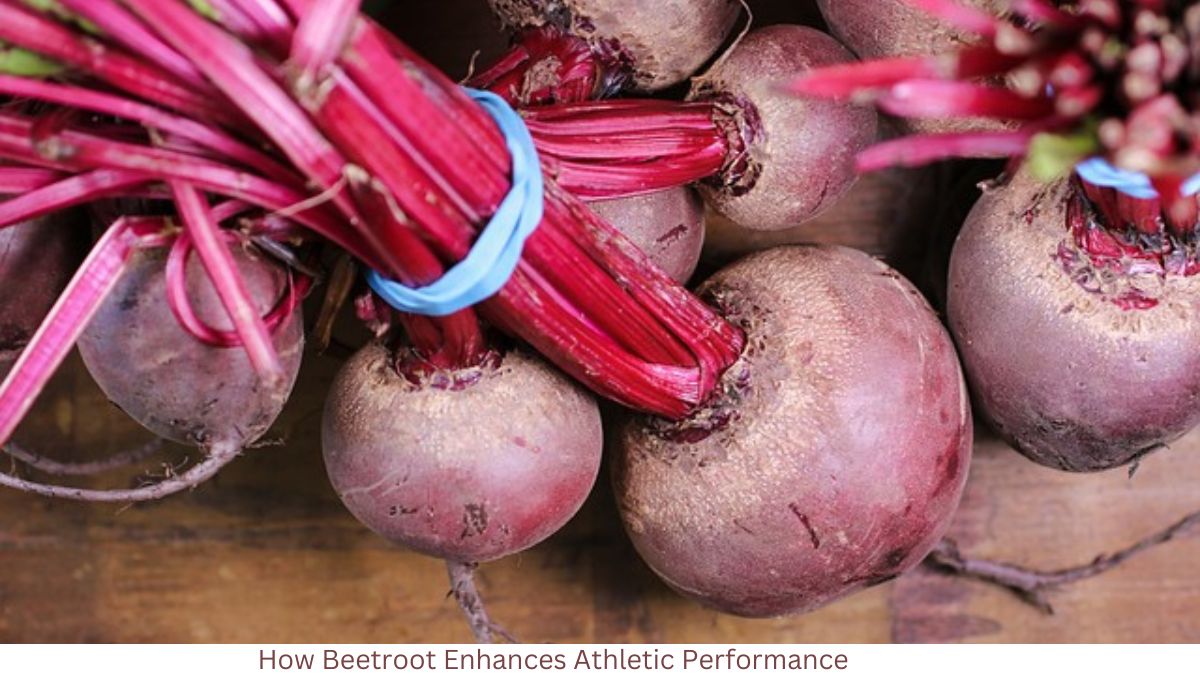Introduction: –
Unveiling the Red Elixir: How Beetroot Enhances Athletic Performance

In the realm of sports and fitness, athletes are constantly seeking ways to gain a competitive edge. While rigorous training and proper nutrition are essential, there’s a natural powerhouse that’s gaining attention for its remarkable benefits: beetroot. Often dubbed as the “red elixir,” beetroot has emerged as a game-changer in enhancing athletic performance.
Beetroot, with its vibrant hue and earthy flavor, packs a nutritional punch that can significantly impact athletic prowess. The secret lies in its high nitrate content. Nitrate, abundant in beetroot, is a compound that the body converts into nitric oxide. This essential molecule plays a pivotal role in enhancing blood flow, improving oxygen delivery to muscles, and ultimately boosting endurance and performance.
Research studies have shed light on the remarkable effects of beetroot on athletic performance. A study published in the Journal of Applied Physiology demonstrated that dietary nitrate supplementation, primarily from beetroot juice, resulted in enhanced exercise performance, particularly in endurance activities. Athletes consuming beetroot juice experienced improved time to exhaustion, increased time trial performance, and reduced oxygen consumption during exercise.
Moreover, beetroot’s nitric oxide-boosting properties contribute to better muscle efficiency and recovery. By facilitating vasodilation, nitric oxide promotes nutrient and oxygen delivery to muscles, aiding in faster recovery post-exercise and reducing muscle fatigue.
The versatility of beetroot makes it an ideal addition to the athlete’s regimen. Whether consumed as fresh juice, incorporated into smoothies, or as a delicious addition to salads and dishes, beetroot offers a convenient and delicious way to reap its performance-enhancing benefits.
Integrating beetroot into pre-workout and post-workout routines can amplify athletic performance and support overall health and wellness. However, it’s essential to note that individual responses may vary, and consulting with a healthcare professional or nutritionist is recommended, especially for athletes with specific dietary considerations or medical conditions.
How does beetroot consumption compare to traditional sports drinks or supplements in terms of enhancing athletic performance?
Comparing beetroot consumption to traditional sports drinks or supplements in terms of enhancing athletic performance reveals several differences and considerations:

- Natural vs. Synthetic: Beetroot is a natural source of nitrates, antioxidants, and other beneficial compounds, whereas traditional sports drinks often contain synthetic additives and high levels of sugar. This natural composition in beetroot may offer additional health benefits beyond athletic performance enhancement.
- Nitric Oxide Production: Beetroot consumption boosts nitric oxide production in the body, leading to improved blood flow, oxygen delivery, and enhanced exercise performance. In contrast, many sports drinks do not directly influence nitric oxide levels and primarily focus on hydration and replenishing electrolytes.
- Sustainability: Beetroot is a sustainable and environmentally friendly option compared to the production and disposal of single-use plastic bottles commonly associated with sports drinks. Choosing beetroot as a performance enhancer aligns with eco-conscious values.
- Nutrient Density: Beetroot is rich in essential nutrients such as vitamins, minerals, and dietary fiber, providing additional health benefits beyond athletic performance. Traditional sports drinks may lack these essential nutrients and offer primarily hydration and electrolyte replenishment.
- Digestive Impact: Beetroot consumption may have a positive impact on digestive health due to its fiber content, promoting gut health and regularity. In contrast, some sports drinks with high sugar content or artificial additives may have negative effects on digestion and overall health.
- Cost-Effectiveness: While the cost of beetroot may vary depending on availability and form (fresh, juice, powder), it can be a cost-effective option compared to regularly purchasing sports drinks or supplements, especially if consumed in its whole food form.
- Personal Preference and Tolerance: Athletes may have individual preferences and tolerances for beetroot’s taste and its effects on digestion. Some may find beetroot juice or supplements more palatable and easier to digest than traditional sports drinks, while others may prefer the convenience of pre-packaged beverages.
In conclusion, while traditional sports drinks and supplements serve their purpose in hydration and electrolyte replenishment, beetroot offers a natural and potentially more holistic approach to enhancing athletic performance. Its unique composition, including nitrates and antioxidants, may provide additional health benefits beyond what traditional sports drinks offer. Ultimately, the choice between beetroot consumption and traditional sports drinks depends on individual preferences, nutritional needs, and performance goals.
What are some creative ways to incorporate beetroot into pre-workout or post-workout meals for athletes?
Incorporating beetroot into pre-workout or post-workout meals for athletes can add a nutritious and performance-enhancing boost. Here are some creative ideas:

- Beetroot Smoothie: Blend cooked or raw beetroot with fruits like berries, bananas, and pineapple, along with leafy greens such as spinach or kale. Add a scoop of protein powder and your choice of liquid (water, coconut water, almond milk) for a refreshing and nutrient-dense pre-workout or post-workout smoothie.
- Beetroot Hummus: Make homemade beetroot hummus by blending cooked beetroots with chickpeas, tahini, garlic, lemon juice, and olive oil. Serve with whole grain pita bread, veggie sticks, or whole grain crackers for a satisfying pre-workout snack packed with protein, fiber, and antioxidants.
- Beetroot Salad: Create a colorful beetroot salad by combining roasted or steamed beetroots with mixed greens, quinoa or farro, avocado, nuts or seeds, and a light vinaigrette dressing. This nutrient-rich salad provides a balance of carbohydrates, healthy fats, and protein for sustained energy before or after a workout.
- Beetroot Energy Balls: Blend cooked beetroot with dates, nuts (such as almonds or cashews), oats, and a hint of cocoa powder or cinnamon. Roll the mixture into bite-sized balls and refrigerate until firm. These beetroot energy balls are convenient, portable, and provide a quick source of energy and nutrients for pre-workout fuel or post-workout recovery.
- Beetroot Pancakes: Add grated raw beetroot to your favorite pancake batter for a vibrant twist. Serve topped with Greek yogurt, fresh berries, and a drizzle of honey for a delicious and nutritious pre-workout breakfast or post-workout treat.
- Beetroot Soup: Prepare a hearty beetroot soup by simmering cooked beetroots with onions, carrots, celery, vegetable broth, and herbs like thyme or rosemary. Blend until smooth and serve with a dollop of Greek yogurt or a sprinkle of feta cheese for added creaminess and protein. Enjoy as a warming pre-workout meal or post-workout recovery option.
- Beetroot Sushi Rolls: Create colorful sushi rolls by wrapping cooked beetroot slices with sushi rice, avocado, cucumber, and your choice of protein (such as cooked shrimp or tofu). Slice into bite-sized pieces and serve with soy sauce or tamari for a protein-rich pre-workout meal or post-workout snack.
These creative ways to incorporate beetroot into pre-workout or post-workout meals offer a variety of flavors, textures, and nutrients to support athletic performance and recovery. Experiment with different recipes and enjoy the benefits of this versatile root vegetable.
Are there any recommended dosages or guidelines for beetroot consumption to maximize its benefits for athletic performance?
While there isn’t a one-size-fits-all recommendation for beetroot consumption to maximize athletic performance, there are some general guidelines to consider:
- Start with Beetroot Juice: Many studies on beetroot’s effects on athletic performance have used beetroot juice as the source of nitrate. A typical dose used in research studies ranges from about 70 to 140 milliliters (approximately 2.4 to 4.7 ounces) of beetroot juice, consumed 2 to 3 hours before exercise.
- Consider Individual Factors: The optimal dosage of beetroot may vary depending on factors such as body weight, fitness level, exercise intensity, and individual response to nitrate supplementation. Some athletes may require higher or lower doses to experience the desired effects.
- Monitor Nitrate Levels: It’s essential to monitor nitrate levels in beetroot juice products, as they can vary significantly between brands and formulations. Look for products with standardized nitrate content to ensure consistency in dosing.
- Be Mindful of Timing: Aim to consume beetroot juice or other beetroot-containing foods 2 to 3 hours before exercise to allow for sufficient nitrate conversion to nitric oxide and optimal performance enhancement.
- Consider Loading Protocols: Some athletes may choose to undergo a beetroot loading protocol in the days leading up to a competition or event. This involves consuming beetroot juice or other beetroot-containing foods daily for several days to saturate the body’s nitrate stores and maximize performance benefits.
- Stay Hydrated: Beetroot juice has a high water content, which can contribute to hydration. However, it’s essential to stay adequately hydrated by consuming additional fluids, especially when engaging in prolonged or intense exercise.
- Monitor Individual Response: Pay attention to how your body responds to beetroot consumption. Some athletes may experience gastrointestinal discomfort or other side effects, particularly when consuming large amounts of beetroot juice. Adjust the dosage or timing as needed to minimize adverse effects.
- Consult with a Professional: If you’re unsure about the appropriate dosage of beetroot for your specific needs or goals, consider consulting with a sports nutritionist, dietitian, or healthcare professional who can provide personalized recommendations based on your individual circumstances.
By following these guidelines and monitoring your body’s response, you can optimize beetroot consumption to support athletic performance and reap the potential benefits of this natural performance enhancer.
Conclusion
In conclusion, beetroot stands as a potent ally for athletes seeking to elevate their performance naturally. With its nitrate-rich composition and ability to enhance blood flow, beetroot offers a compelling solution for improving endurance, reducing fatigue, and optimizing recovery. Embrace the power of the red elixir and unlock your full athletic potential with beetroot.






